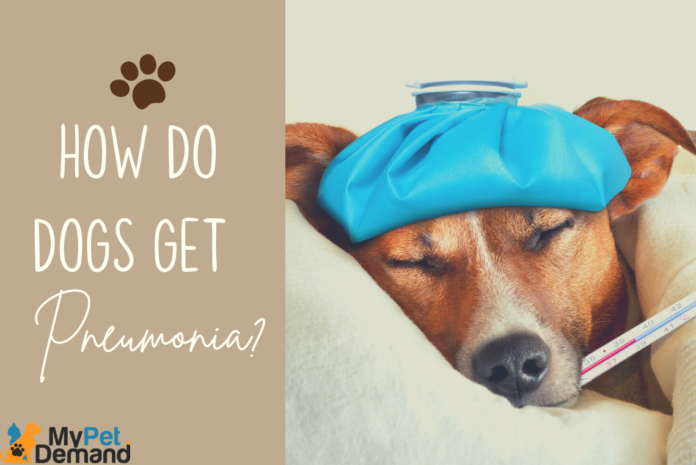Dogs, our beloved four-legged companions, can suffer from various respiratory conditions, and one of the most serious among them is pneumonia. How do dogs get pneumonia? The answer involves multiple factors, from bacterial infections to viral causes, and understanding these can help pet owners protect their furry friends better
Understanding Canine Pneumonia
Pneumonia is a severe inflammation of the lungs that can affect dogs of all ages and breeds While some dogs are more susceptible than others, it’s crucial for every pet owner to understand the various ways dogs can contract this condition. If you’re looking for more information about various dog health conditions, check out our comprehensive guide on dog health and wellness
Common Causes of Pneumonia in Dogs
Bacterial Infections
The most common cause of pneumonia in dogs is bacterial infection, These nasty little organisms can enter your pup’s respiratory system through – Inhaling contaminated particles- Aspiration of vomit or food- Secondary infections following a viral illness
Viral Infections
Several viruses can lead to pneumonia in dogs, including:- Canine distemper virus- Canine influenza- Parainfluenza virus
Fungal Causes
In some regions, fungal infections can cause pneumonia. These typically occur when dogs inhale fungal spores from contaminated soil.
Risk Factors That Make Dogs Susceptible
Several factors can increase your dog’s risk of developing pneumonia:
- Age
- Very young puppies
- Senior dogs
- Dogs with compromised immune systems
- Living Conditions
- Overcrowded kennels
- Poor ventilation
- Unsanitary environments
- Health Status
- Chronic diseases
- Recent surgeries
- Immunosuppressive medications
Recognizing the Symptoms
Early detection is crucial for successful treatment. Watch out for these signs:
- Persistent coughing
- Difficulty breathing
- Nasal discharge
- Lethargy
- Loss of appetite
- Fever
- Rapid breathing
- Exercise intolerance
Prevention Strategies
At Pet like boss, we recommend these preventive measures:
- Vaccination
- Keep vaccinations up-to-date
- Regular vet check-ups
- Boosters as recommended
- Environmental Management
- Clean living space
- Good ventilation
- Avoid exposure to sick dogs
- General Health Maintenance
- Regular exercise
- Proper nutrition
- Dental hygiene
Treatment Options
If your dog develops pneumonia, treatment typically includes:
Immediate Care
- Hospitalization (in severe cases)
- Oxygen therapy
- IV fluids
Medications
- Antibiotics
- Anti-inflammatory drugs
- Bronchodilators
Supportive Care
- Rest
- Humidified air
- Careful monitoring
Special Considerations for Different Dog Types
Puppies
Puppies are particularly vulnerable to pneumonia because their immune systems aren’t fully developed. They require:- Extra monitoring- Careful temperature control- Frequent feeding
Senior Dogs
Older dogs may need:- Modified treatment protocols- More frequent check-ups- Longer recovery periods
Brachycephalic Breeds
Flat-faced breeds like Pugs and Bulldogs may experience:- More severe symptoms- Longer recovery times- Need for specialized care
Recovery and Rehabilitation
The recovery process typically involves:
- Gradual Return to Activity
- Short walks
- Monitored exercise
- Increased activity as strength returns
- Follow-up Care
- Regular vet visits
- Monitoring breathing
- Checking temperature
- Long-term Management
- Environmental modifications
- Lifestyle adjustments
- Preventive measures
When to Seek Emergency Care
Seek immediate veterinary attention if your dog shows:- Severe difficulty breathing- Blue-tinged gums- Collapse- Extreme lethargy
The Role of Regular Veterinary Care
Regular check-ups can help:- Detect early signs of respiratory issues- Monitor overall health- Update vaccinations- Provide preventive care
Living with a Dog Recovering from Pneumonia
Tips for at-home care:1. Create a clean, quiet recovery space2. Monitor breathing and activity3. Follow medication schedules strictly4. Provide proper nutrition5. Maintain good hygiene
Future Prevention
After recovery, focus on:- Strengthening immune system- Regular health monitoring- Environmental improvements- Lifestyle modifications
Understanding how dogs get pneumonia is crucial for prevention and early intervention. By staying informed and vigilant, pet owners can help protect their furry friends from this serious condition. Remember, prevention is always better than cure, and regular veterinary care plays a vital role in maintaining your dog’s respiratory health.
Remember to always consult with your veterinarian for personalized advice about your dog’s health, as they can provide the most appropriate guidance based on your pet’s specific needs and circumstances.
FAQs About Dog Pneumonia
-
Can dogs catch pneumonia from humans?While rare, it’s possible in some cases.
-
How long does it take for a dog to recover from pneumonia?Recovery typically takes 2-3 weeks with proper treatment.
-
Is pneumonia in dogs contagious to other pets?Some forms can be contagious to other dogs.
-
What’s the cost of treating pneumonia in dogs?Treatment costs vary but can range from $150 to $3000 depending on severity.
-
Can pneumonia in dogs be prevented?While not all cases can be prevented, many can be avoided through proper care and vaccination.












